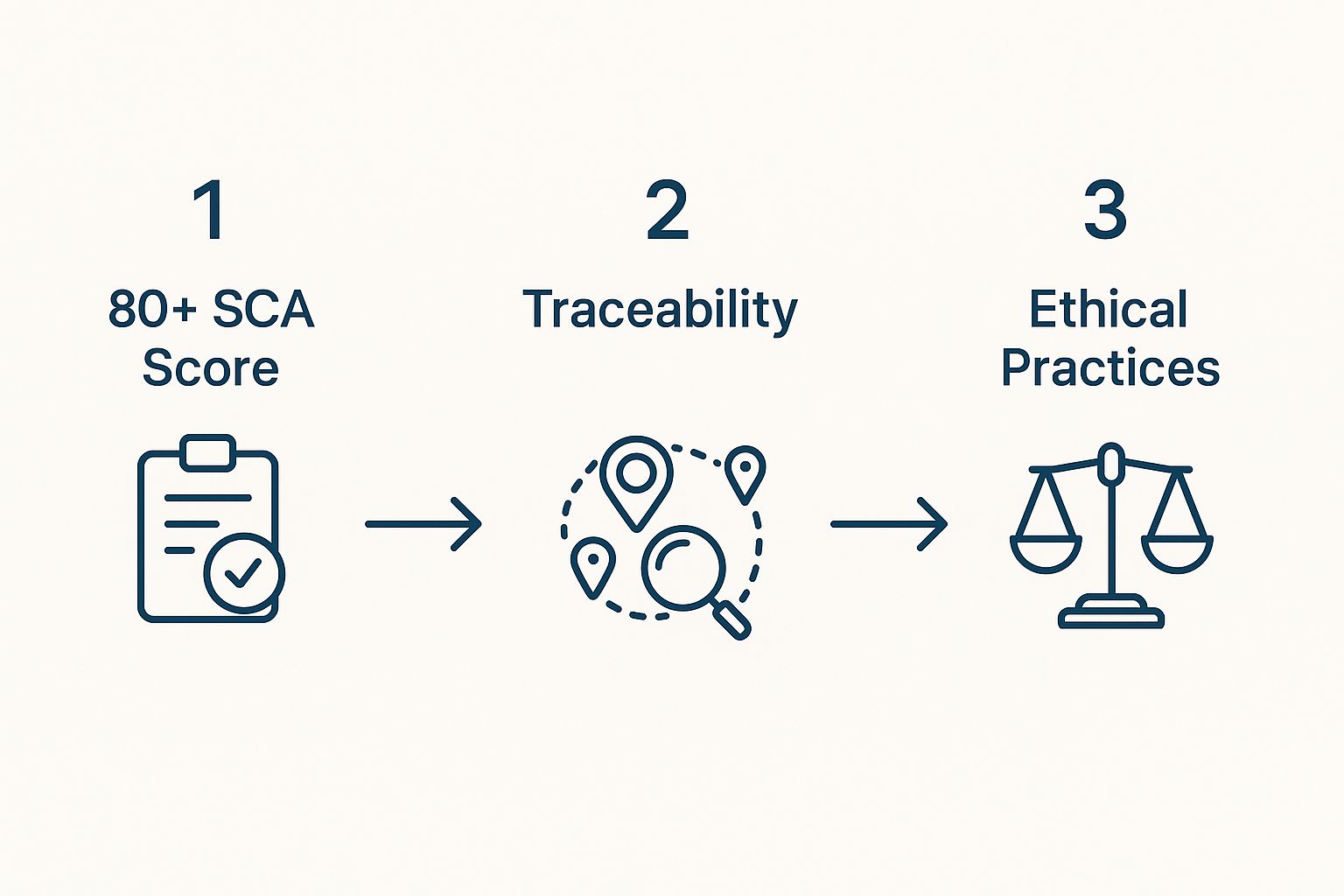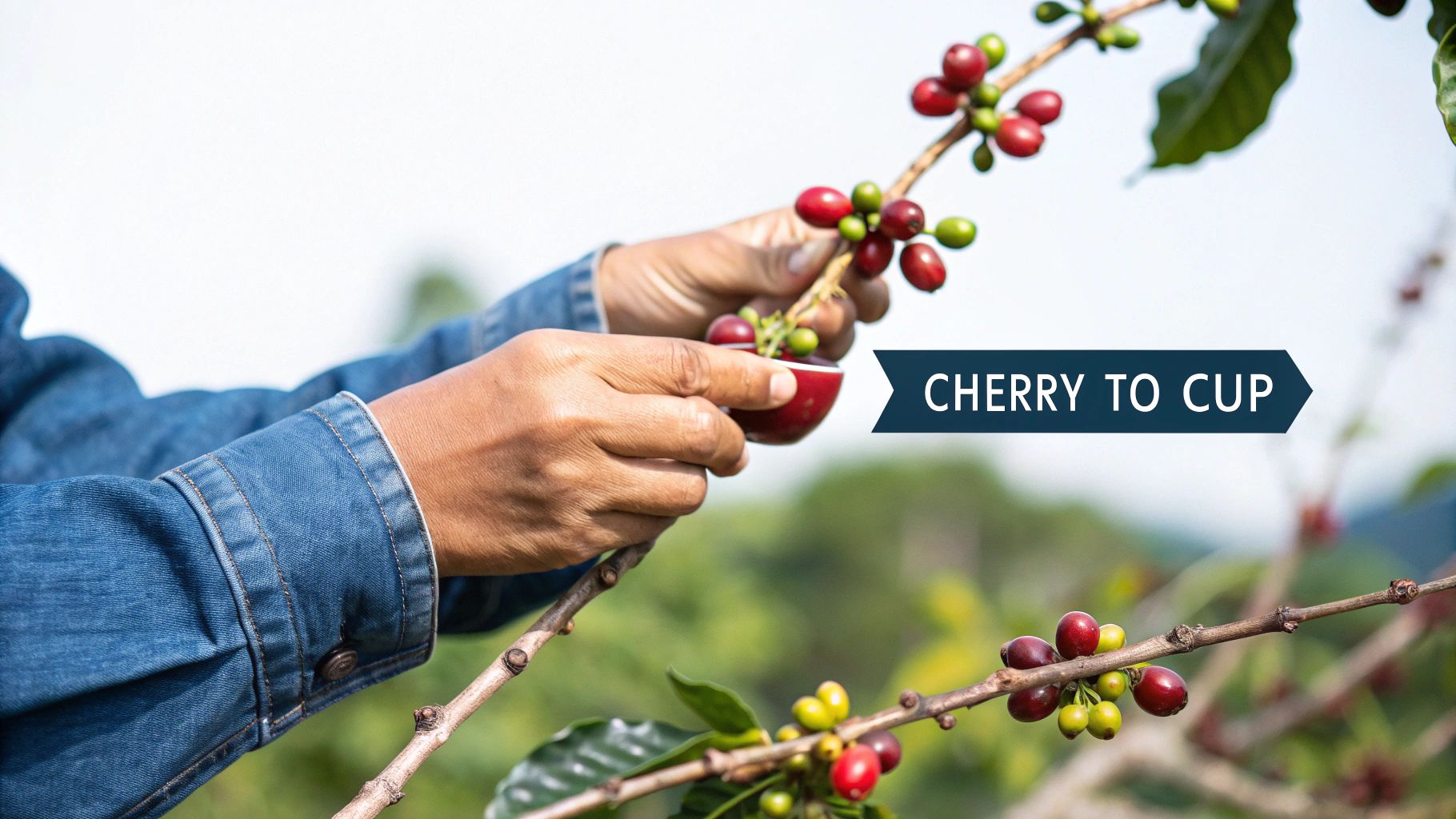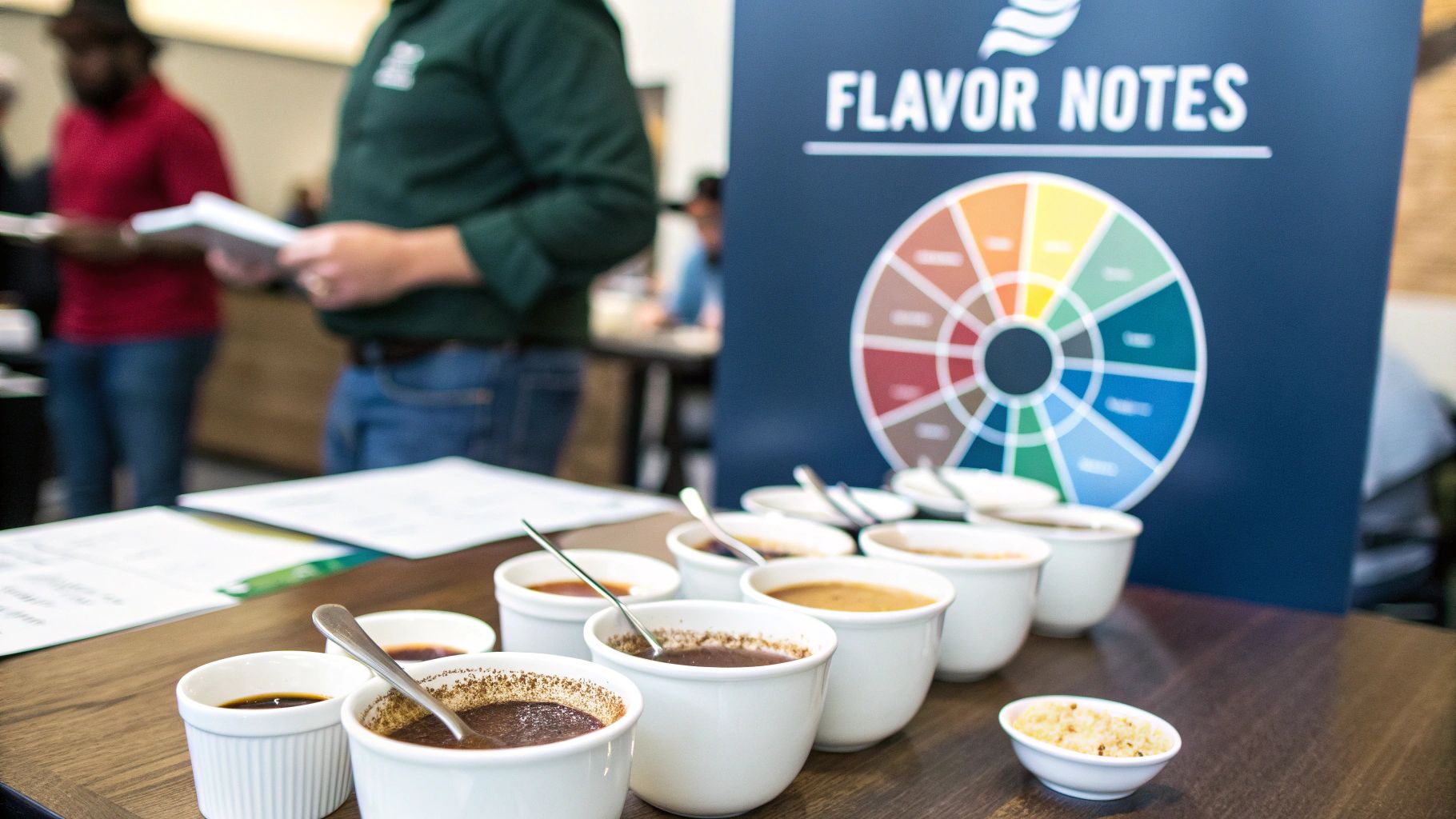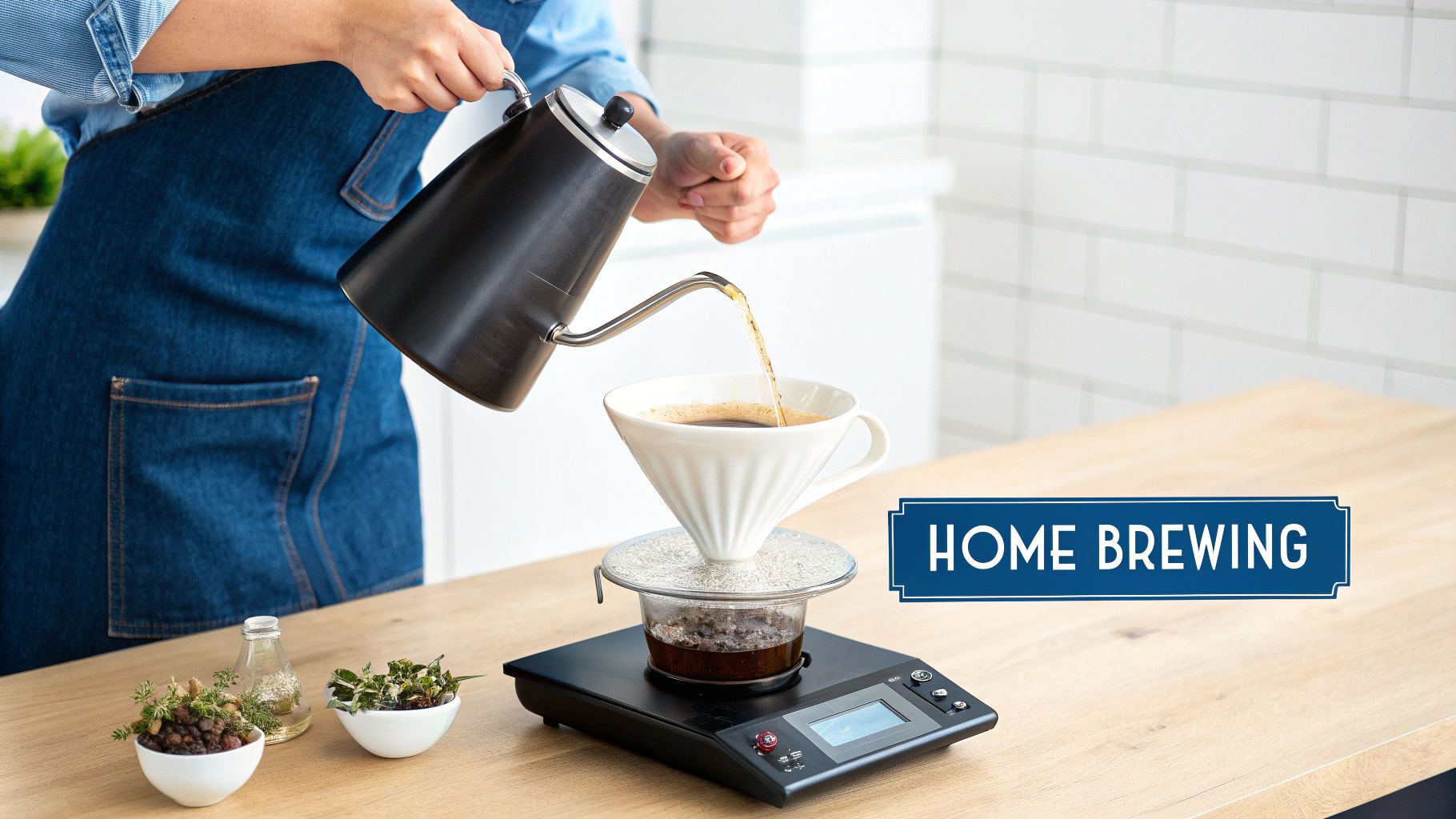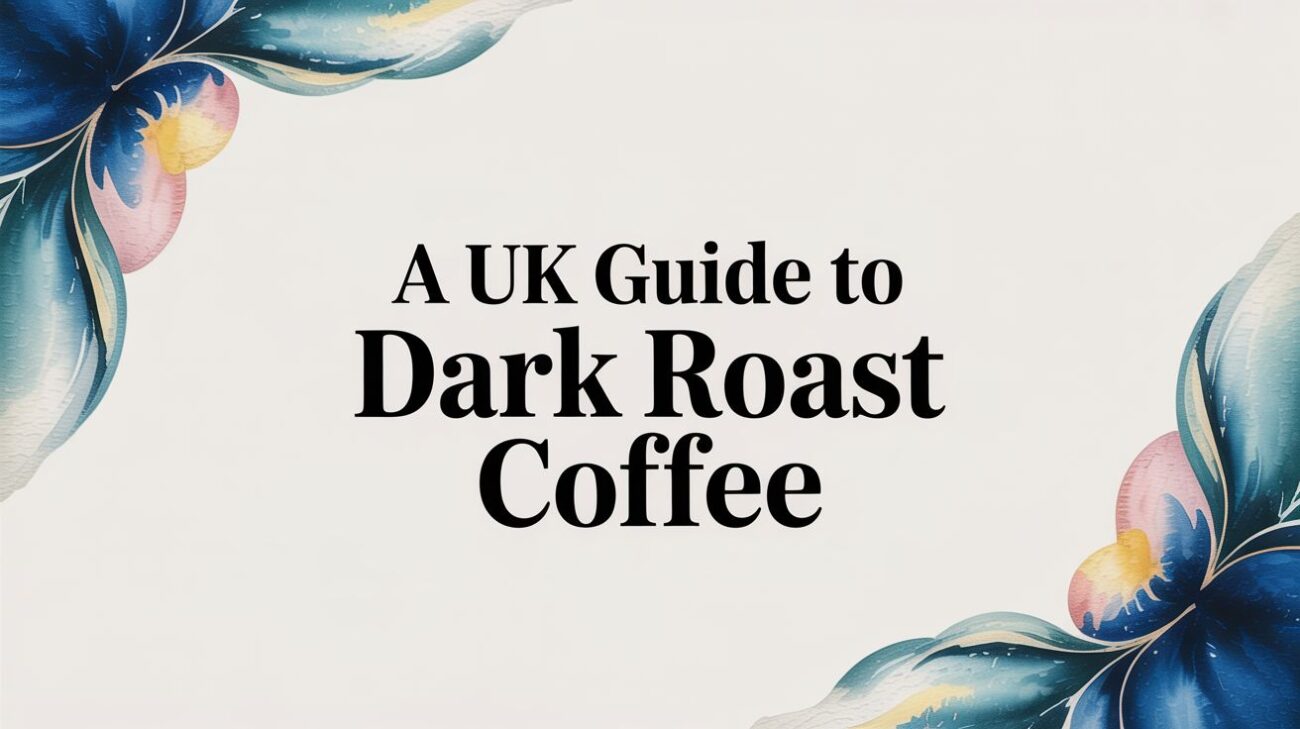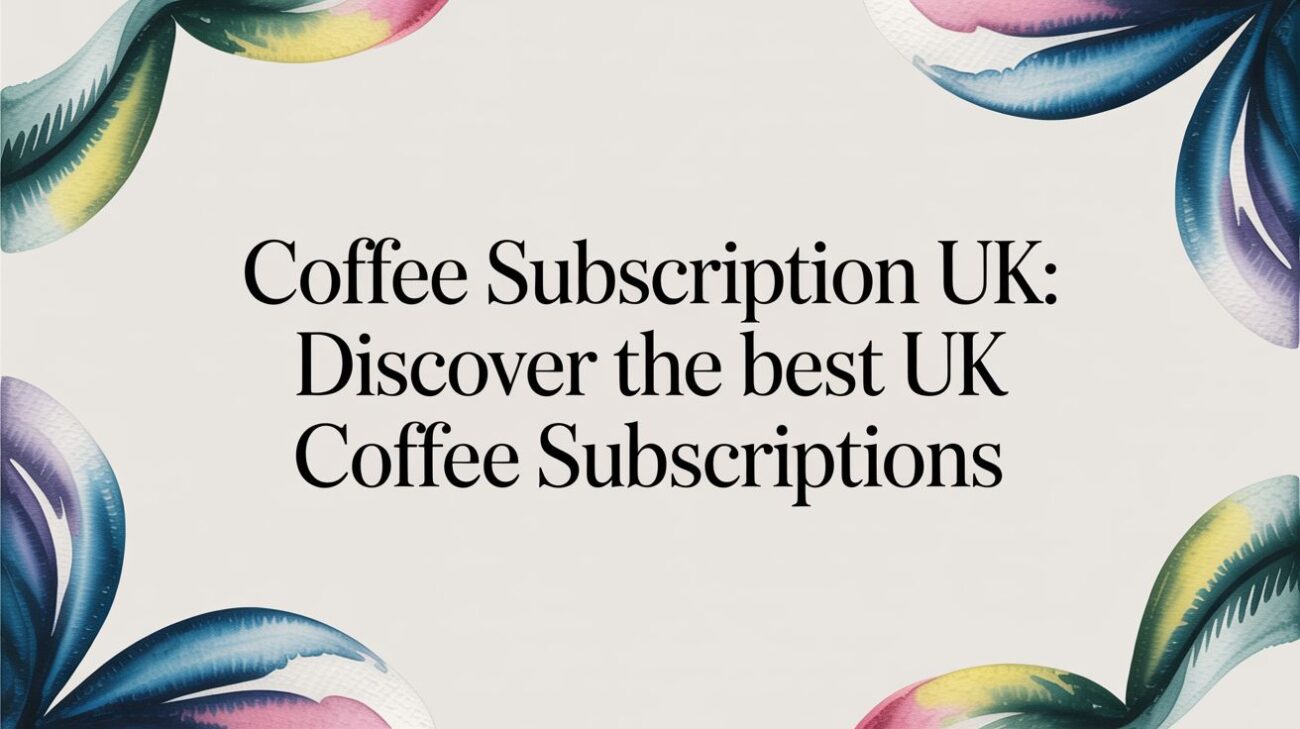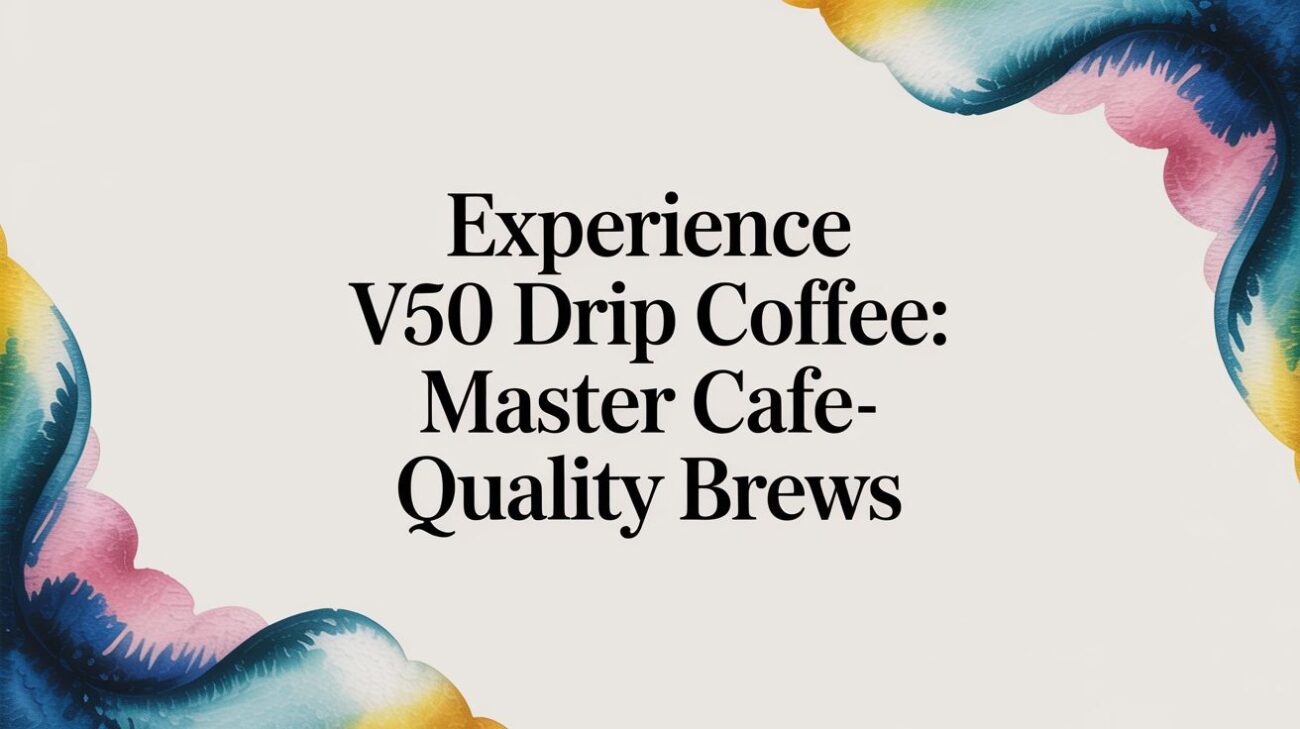What Is Specialty Coffee: A Complete Guide
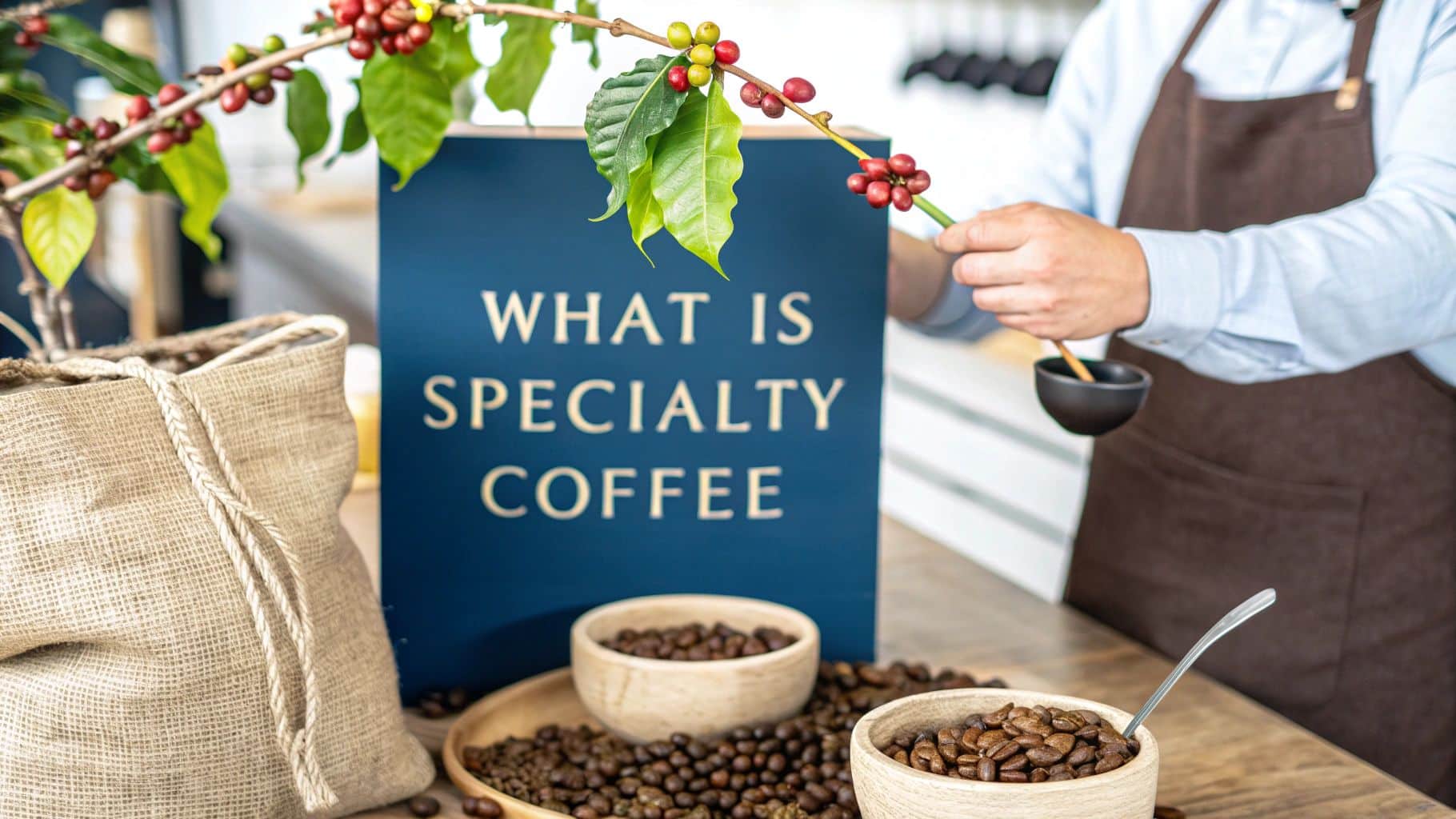
In the simplest terms, specialty coffee refers to beans that score 80 points or higher on a 100-point scale when graded by certified coffee tasters. But really, it’s so much more than just a number. Think of it as a guarantee of quality that follows the bean every step of the way, from the soil it was grown in right into your cup.
Deconstructing Specialty Coffee
It helps to think of the difference between a fine wine and your average table wine. Both are made from grapes, of course, but one is meticulously crafted to express the unique story of its origin—the soil, the climate, the altitude. This concept is known as terroir.
Specialty coffee embraces this same philosophy. It’s all about focusing on every tiny detail to produce a cup that is distinctive, clean, and complex. This is what truly sets it apart from the mass-produced commercial coffee you might find on a supermarket shelf.
This dedication to excellence begins right at the source. It’s about farmers who painstakingly hand-pick only the ripest coffee cherries, roasters who skilfully coax out intricate flavour profiles, and baristas who have mastered the art of extraction. Each step is crucial in preserving the coffee’s inherent quality. If you're keen to unlock these amazing flavours yourself, you can explore different approaches with our tips on how to brew coffee at home.
The infographic below breaks down the core principles that really define what specialty coffee is all about.
As you can see, that high score is just the starting point. It's the gateway to a transparent, fair, and delicious supply chain.
Specialty Coffee vs Commercial Coffee At a Glance
To quickly see how these two worlds differ, this table breaks down the fundamental distinctions between specialty coffee and its commercial-grade counterpart. It highlights everything from quality standards to sourcing ethics.
| Attribute | Specialty Coffee | Commercial Coffee |
|---|---|---|
| Quality Score | Scores 80+ on a 100-point scale | Typically scores below 80 points |
| Bean Quality | High-grade Arabica beans with minimal defects | Often Robusta or lower-grade Arabica blends |
| Flavour Profile | Complex, distinctive notes reflecting origin | Standardised, often bitter or flat flavour |
| Harvesting | Selective hand-picking of ripe cherries | Mechanical harvesting, mixing ripe & unripe |
| Sourcing | Traceable to a single farm or cooperative | Sourced in bulk from various unknown origins |
| Roasting | Small-batch roasting to highlight unique flavours | Large-scale roasting for consistency and shelf life |
| Ethics | Focus on direct trade and fair prices for farmers | Commodity pricing with less focus on farmer welfare |
This comparison makes it clear that the "specialty" label is earned through a commitment to excellence at every single stage of the process.
More Than Just a Drink
So, what is specialty coffee when you get right down to it? It’s a celebration of flavour, origin, and the incredible hard work of everyone involved in getting it to you. This quality-first mindset is built on three key pillars:
- Exceptional Quality: Only the top 5% of coffee harvested worldwide has what it takes to earn the specialty grade. This rigorous standard means minimal defects and a far superior taste.
- Complete Traceability: You can often trace a bag of specialty coffee right back to the single farm, estate, or even the specific group of farmers who grew it.
- Ethical Sourcing: This approach champions fair prices and direct relationships with producers, which promotes sustainability and helps build better livelihoods for farming communities.
At its heart, specialty coffee is an experience. It’s about appreciating the unique story behind each bean, from its specific growing region to the distinct tasting notes that make every cup a small adventure.
The Journey from Cherry to Cup
The story behind what makes specialty coffee so special begins long before a single bean ever hits the roaster. It all starts on a farm, often tucked away in remote, high-altitude regions, where the coffee plant bears its fruit: the cherry.
Unlike mass-market coffee, which is typically strip-picked by machines, the journey of a specialty bean starts with selective harvesting. This isn't just a fancy term; it's a meticulous process where skilled farmers pick only the perfectly ripe, deep red cherries by hand.
This careful selection is the first and most critical step in quality control. It guarantees that sour, under-ripe fruits or fermented, overripe ones never make it into the final bag, setting a high standard right from the start. It’s a labour-intensive method, but it honours the incredible flavour potential locked inside each cherry.
From Fruit to Bean: Processing Methods
Once the cherries are picked, the clock starts ticking. They need to be processed quickly to separate the bean from the surrounding fruit pulp. Think of the processing method as a chef's technique—it has a profound impact on the final flavour profile, shaping how the coffee tastes in the cup.
You'll often see these three primary methods mentioned on coffee bags:
- Washed Process: The fruit pulp is completely washed away from the bean with water before drying. This method produces a very clean, crisp, and bright cup, allowing the bean's inherent acidity and unique origin characteristics to shine through with absolute clarity.
- Natural Process: The entire cherry is left intact and dried in the sun, almost like turning a grape into a raisin. This allows the sugars and flavours from the fruit to seep into the bean, resulting in a coffee that is often sweet, intensely fruity, and complex with a heavier body.
- Honey Process: This is the happy medium between the washed and natural worlds. Some, but not all, of the fruity layer is left on the bean as it dries. This process creates a cup that balances the clean acidity of a washed coffee with the syrupy sweetness of a natural.
Understanding these methods helps you predict the kinds of flavours you might enjoy. For coffee lovers keen to explore how origin and processing dance together, learning about what single-origin coffee is can offer a much deeper insight into these unique profiles.
The Final Verdict: SCA Scoring
After processing and drying, the green beans are ready for their most important test: grading. This is where the Specialty Coffee Association (SCA) comes in. The SCA has developed a standardised, 100-point scoring system used by certified experts, known as Q Graders, to officially assess the quality of a coffee.
During a process called 'cupping', graders meticulously evaluate multiple attributes, including aroma, flavour, aftertaste, acidity, body, and balance. A coffee must score 80 points or higher to officially earn the 'specialty' grade.
This rigorous evaluation is the final gatekeeper of quality. It ensures that only the beans that are free of major defects and possess distinctive, pleasing characteristics make it to roasters and, ultimately, into your cup. It’s the system that validates all the hard work that came before it, from the careful hand-picking to the precise processing.
The Art of Sourcing and Roasting Coffee
After a coffee bean has been meticulously grown, picked, and processed, it arrives as a small, green seed, brimming with dormant potential. But it’s the final two stages—ethical sourcing and skilful roasting—that truly unlock its character and transform a great green bean into the exceptional coffee you enjoy.
Sourcing in the specialty world goes miles beyond just buying a commodity. It’s about building genuine, sustainable relationships with the farmers and cooperatives who pour their lives into cultivating these amazing coffees. This is where concepts like direct trade come into play.
Unlike impersonal transactions on the open market, direct trade is a true partnership. Roasters work closely with producers, ensuring they receive a fair price that far exceeds the standard commodity rate. This empowers farmers to invest back into their land, their equipment, and their communities, creating a virtuous cycle of quality and sustainability.
The Power of Ethical Partnerships
Ethical sourcing isn't just a buzzword; it’s a genuine commitment to transparency and mutual respect. When you see a coffee’s origin detailed right down to a specific farm or washing station, you’re seeing this principle in action.
This focus on ethical practices is really resonating with people. The UK specialty coffee market is part of a global trend, with growth expected to accelerate at a rate of around 10.4% per year between 2025 and 2030. This isn't just a number; it reflects a real consumer shift towards premium products with an ethical backbone.
By choosing ethically sourced specialty coffee, you're not just buying a superior product; you're casting a vote for a more equitable and sustainable coffee industry for everyone involved.
From Green Bean to Aromatic Brown
Once sourced, the green beans finally arrive at the roastery. This is where the real artistry begins. A roaster is like a conductor, carefully applying heat and managing time to orchestrate a symphony of chemical reactions that develop thousands of aromatic compounds. This is where the magic happens.
Every coffee has a unique roast profile—a specific recipe of time and temperature designed to highlight its very best qualities. The goal isn't to impart a generic 'roasty' taste, but to coax out the delicate flavours of its origin, whether that’s the bright citrus notes of a Kenyan coffee or the deep, chocolatey richness of a Brazilian one. For a deeper dive into this craft, check out our guide on how coffee roasting profiles are developed.
In specialty coffee, you’ll almost always find light to medium roasts, and that’s a very deliberate choice. Over-roasting can easily burn away all the subtle nuances, replacing them with a singular, smoky flavour. A lighter touch, however, preserves the bean’s inherent character, allowing its unique story to be told in the final cup. Exploring the differences between light and dark roasts is a great way to understand this crucial part of flavour creation.
How to Understand Flavour Profiles and Tasting Notes
Pick up a bag of specialty coffee, and you'll find descriptions like ‘jasmine, blueberry, and lemon’. It’s easy to wonder if you’ve accidentally grabbed a fruit tea. But here’s the secret: those aren’t added flavours. They’re the natural, inherent characteristics of the coffee bean itself, brought to life by a skilled roaster.
Think of tasting notes as a language for flavour. They’re the subtle hints of fruit, flowers, spices, or nuts that make each coffee a unique experience. This is where the real adventure begins, moving beyond simple descriptions like 'strong' or 'mild' into a world of incredible nuance.
To help map out this world, the Specialty Coffee Association (SCA) developed the Flavour Wheel. It’s not some complex chart you need to memorise. Instead, see it as a helpful guide that organises tastes into categories, starting with broad ideas like 'fruity' and narrowing down to specific notes like 'blackberry' or 'grapefruit'.
Connecting Flavour to Origin
A coffee's flavour profile is deeply tied to where it was grown. Just like wine from the Bordeaux region of France tastes different from a Californian Merlot, coffee beans carry the signature of their home. This connection between place and palate is what makes exploring different coffees so incredibly rewarding.
You’ll start to notice patterns linking a coffee’s origin to its taste:
- Ethiopian Coffees: Famous for their bright, aromatic character, beans from regions like Yirgacheffe often burst with floral notes of jasmine or bergamot alongside a vibrant citrusy zing.
- Colombian Coffees: Many Colombian coffees are celebrated for being incredibly balanced and classic. You'll often find comforting notes of caramel, chocolate, and a lovely nutty sweetness.
- Kenyan Coffees: These are known for their bold, almost wine-like acidity and complex fruit notes. It's not uncommon to taste hints of blackcurrant or even a ripe, juicy tomato.
Exploring these regional differences is one of the greatest joys of specialty coffee. You can discover a whole world of unique tastes by trying different single-origin coffee beans and paying attention to how their profiles differ.
The goal isn't to guess every single note correctly. It’s about slowing down and paying attention, allowing you to appreciate the subtle, layered experience that a high-quality coffee offers.
How to Taste Coffee at Home
You don't need to be a professional taster to start picking out these flavours. The first step is simple: pay closer attention to what you’re smelling and tasting. Try breaking the experience down into four key parts: aroma, acidity, body, and finish. Focusing on one at a time is a great way to build your sensory skills.
This approach isn't unique to coffee, either. It’s fascinating to see how experts in other fields develop their palates. Learning about the universal techniques to master tasting notes and flavour profiles in other complex drinks can offer a fresh perspective. By training your senses, you’ll transform every cup from a simple drink into a fascinating experience.
How to Find and Enjoy Specialty Coffee in the UK
So, you understand what makes specialty coffee different. Now for the best part: finding and enjoying it for yourself. Luckily, the UK’s coffee scene is buzzing, which means diving in has never been easier. This is your practical guide to navigating the landscape, whether you’re buying a bag of beans or stepping into a new café.
The UK's branded coffee shop industry is now valued at a massive £6.1 billion, and specialty coffee is a huge slice of that pie. The market grew by 5.2% in the last year alone, reaching 11,456 outlets across the country. That's a lot of incredible coffee just waiting to be discovered. For a deeper dive, check out the Project Café UK 2025 report.
Decoding the Coffee Bag
Your journey into great coffee usually starts with a bag of beans. Forget the generic supermarket stuff; a specialty coffee bag is a treasure map, telling you the complete story of what’s inside. Learning to read it is the first step to picking a coffee you’ll genuinely love.
Here’s what to look for:
- Origin: It won't just say "Colombia." It’ll specify a region, co-operative, or even a single farm. This is your biggest clue to the flavour profile.
- Processing Method: Words like ‘Washed’, ‘Natural’, or ‘Honey’ give you a hint about the coffee's body and taste.
- Tasting Notes: These aren’t added flavours, but the coffee's inherent character—think ‘caramel, red apple, and almond’.
- Roast Date: This is non-negotiable. Coffee is a fresh product, and its vibrant flavours fade. Always, always check for a recent roast date.
Finding Your Local Specialty Hub
Independent roasters and cafés are the beating heart of the specialty community. They’re much more than just places to grab a drink; they are hubs of knowledge and passion, usually run by people who live and breathe coffee. A real specialty café has baristas who can chat with you about what they’re serving and guide you to something that suits your taste.
When you support an independent roaster or café, you’re not just getting a better cup of coffee. You’re investing in a local business that champions quality, sustainability, and fair relationships with coffee producers around the world.
Brewing at Home
You don't need a high-tech, expensive setup to brew fantastic coffee at home. Simple brewers like a V60, AeroPress, or a classic French press can unlock the incredible potential hidden inside high-quality beans.
All you really need are three things: freshly roasted coffee, a decent grinder, and good water. Experimenting with brewing at home is a seriously rewarding way to connect with your coffee and figure out the subtle nuances you enjoy most. For a brilliant starting point, you can explore a curated selection of specialty coffee beans online and find your next favourite.
A Few Final Questions About Specialty Coffee
To wrap things up, let's tackle a few common questions that pop up on the journey into better coffee. Think of these as the final pieces of the puzzle, helping everything click into place.
Is Specialty Coffee Always Expensive?
While specialty coffee often has a higher price tag than what you'd find in the supermarket, that cost tells a story of quality and ethics. You're paying for meticulous farming, fair wages for the people who grow it, and a flavour experience that commodity coffee just can't match. It's less about being expensive and more about being an affordable luxury, like a great loaf of artisan bread or a craft beer.
The demand for quality is definitely growing. The average Briton drinks around 528 cups of coffee a year, and the amount we drink outside the home is projected to jump from 29.8 million kilograms to 34.5 million by 2028. It's a clear sign we're moving towards better brews. For a deeper dive, you can find more statistics on the UK coffee market's growth over at Lumina Intelligence.
Does '100% Arabica' Mean It's Specialty Coffee?
Not necessarily, and this is a really common misconception. While almost all specialty coffee is indeed Arabica—simply because it has far greater potential for complex and beautiful flavours—not all Arabica coffee makes the specialty grade. Poor growing conditions or defects during harvesting can easily produce a low-quality Arabica bean.
The "specialty" title isn't a birthright; it's an achievement. It's only earned by passing the demanding SCA scoring process, which acts as a guarantee that you're getting the absolute best of the crop.
Do I Need Fancy Gear to Brew Specialty Coffee?
Absolutely not! You can make an incredible cup of coffee with simple, affordable kit like a French press or a V60. The real heroes are the beans themselves—freshly roasted and high-quality—and some good water.
Of course, a high-end grinder can give you more control, but the coffee is what truly matters. Plenty of straightforward brewing methods are more than capable of unlocking the amazing and unique flavours waiting inside the beans, right in your own kitchen.
Ready to taste the difference for yourself? At Seven Sisters Coffee Co, we source and roast some of the world's most exceptional beans, bringing an incredible taste experience straight to your door. Find your new favourite brew today at https://sevensisterscoffee.co.uk.

